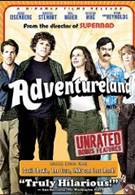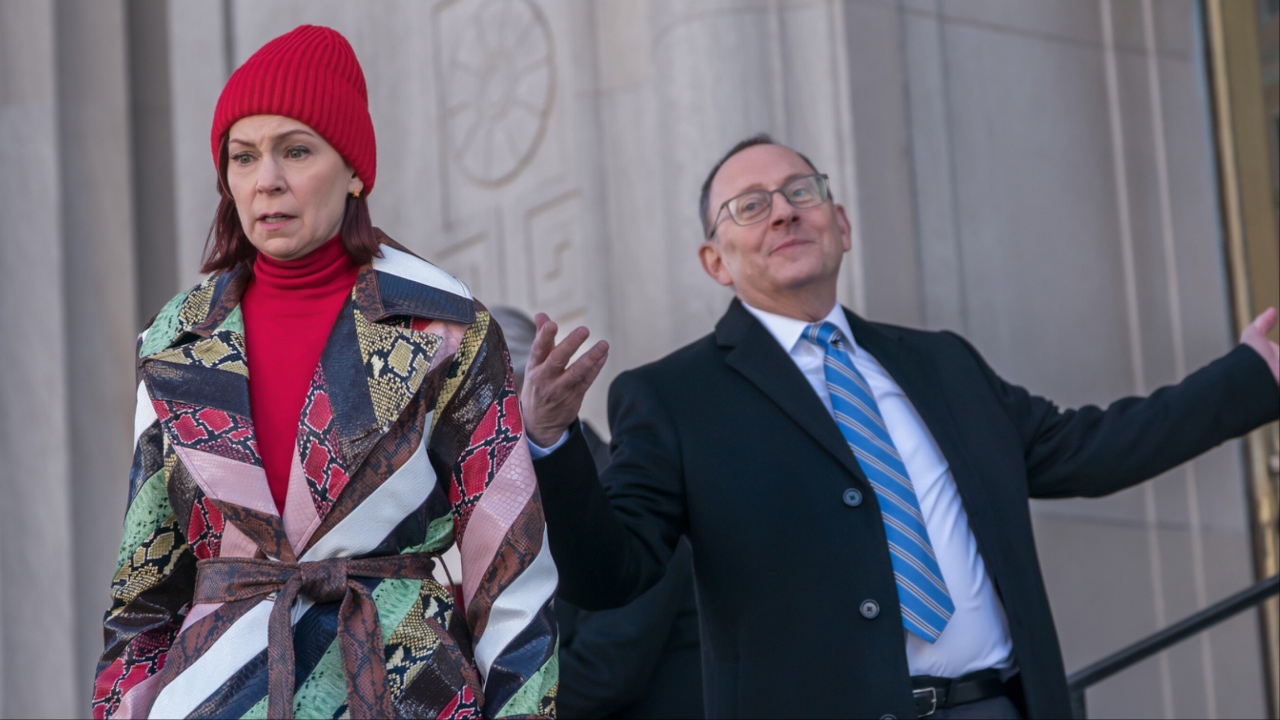Writer-director Greg Mottola may have gotten more attention for directing the coming-of-age buddy-comedy Superbad, but this year’s Adventureland is by far the superior film. Eschewing Superbad’s more over-the-top antics, Adventureland is by turns sentimental and bittersweet, a quiet little love letter to growing up, the friends you meet while working shitty jobs, and the fact that falling in love for the first time is almost never the way you thought it would be. It’s the summer of 1987 and James Brennan (Jesse Eisenberg) is psyched and ready to join his friend trekking across Europe before coming back home to head off to the Ivy League. Then his parents sit him down for some bad news: dad’s career has taken a turn for the worse, funds are short, and the trip to Europe has gone the way of the dodo…as has his money for college. Forced to find a summer job to salvage his future, Jesse starts work at a crappy, run-down theme park called Adventureland. There he bonds with fellow minimum-wage sufferer Joel (Martin Starr), strikes up an unlikely friendship with the park’s handyman who once jammed with Lou Reed (Ryan Reynolds), and falls head over heels for a troubled local girl who’s got plenty of her own problems (Kristen Stewart). As the summer passes by, James is forced to realize that the future might not be what he expected, but that doesn’t mean he can’t make it his own.
Every now and then a film comes along and hits your right where you live. The events onscreen may not mirror your own life at all, but some element of the story or characters resonates deeply with you. In my experience, the films that really get to you aren’t always even great films – one of the last ones that clicked this well with me was The Girl Next Door; it’s a film I love, but I’d never argue for its inclusion in the modern canon or anything. Adventureland is one of those films for me, a story and characters that speak in a timeless manner reminiscent of the best of John Hughes. As with Hughes' films, Adventureland doesn’t have to manufacture artificial conflict or fall back on gross-out humor just because it’s a story about young adults. It realizes that there are plenty of down-to-earth problems we all go through at this age, and while in retrospect they might not be as important as those we’ll face later in life, at the time they seem just as dire and difficult. Whether you were of appropriate age to experience the ‘80s in the same way as these characters (I was a decade or so too young), everybody has worked a crappy job, but come away from it with good friends. Everybody has felt like the future they thought they were going to have is falling apart. And pretty much all of us, at some point or another, have fallen in love for the first time.
Writer-director Greg Mottola talks during the commentary about wanting to tell a story about a character who is experiencing love, real love, for the first time. Adventureland is about Jesse realizing just how much more complicated, how much more difficult, and how much more rewarding the real thing can be than the youthful infatuations that came before. The way Adventureland handles first love is emblematic of Mottola’s approach to storytelling as a whole here. His script and direction are naturalistic and honest throughout. People talk the way they really talk, not the way people in movies talk, and they almost never say the right thing or the clever thing at the right time. There are no easy answers. People are flawed and don’t magically have a revelation and become a better person at the end of the third act. Ryan Reynolds' Connell is a perfect example of this. He spends the entire film cheating on his wife, but he’s never dismissed as a stereotypical asshole alpha male. Mottola won’t let us take the easy path of hating Connell, making him as much a subject of pity as of indignation. Like all the characters in the film, he feels trapped in his life, and the real tragedy is not just the damage his selfishness causes to those around him, but the fact that he honestly still thinks he’s the victim. He’s an unfaithful jerk. He’s also a likeable, charismatic guy. Like all of us, he’s a tangled mess of conflict and contradiction.
Unlike so many comedies, Adventureland never assumes its audience is a pack of idiots. It lets us fill in the gaps and doesn’t feel obligated to spell out every nuance and plot point. When Jesse crashes his parents’ car after getting smashed on the bottle of liquor his dad keeps hidden under the car seat, there’s no heated scene where Jesse confronts his dad about his alcoholism. We know about his dad’s troubles at work, and the mere presence of the bottle, coupled with the priceless look on his dad’s face (beautifully played by actor Jack Gilpin), tells us everything we need to know. The moment where Jesse realizes how much of Connell’s rocker mystique is bullshit is similarly understated. When Jesse catches Connell misquoting the name of one of Lou Reed’s best-known songs, a lesser writer would have treated us to an overwrought, “You never even jammed with Lou Reed, did you?” scene. Mottola knows better than that, and he expects more of us. It’s all done with implication and performance, and the result is much more honest and elegant than we have any right to expect from Hollywood these days.
Performances as well are excellent across the board. Adventureland shows us something you don’t often see in movies or TV, something we haven’t really seen that much since the demise of Freaks and Geeks: real kids who occupy that strata somewhere between popular/beautiful/cool and maladjusted/hopelessly nerdy. Most of us weren’t chiseled football stars or nubile cheerleaders in high school, but neither were we cartoonish nerds who spent our formative years being shoved into our lockers. Most of us were somewhere in between: just awkward, nervous kids who stuck to our own and tried to get by. Jesse reads poetry because he likes it and speaks with a multisyllabic vocabulary, both traits that would lead many Hollywood comedies to shorthand him into some sort of bespectacled, acne-ridden nerd just because that’s easier than admitting that people aren’t clichés. He’s a virgin not because no one would have him or because he’s hopelessly awkward, but because losing your virginity is never as easy as the movies make it look, and because he genuinely wants the experience to be more than just a trophy to acquire. Jesse and Joel and Kristen Stewart’s Em are people you’ll recognize, people you’ve grown up with, people you probably know right now. And if you want irrefutable proof of the difference a talented director and a solid script can make to an actor’s performance, compare Kristen’s role here to that in a recent high-profile sparkly-vampire movie.
Despite all this high-fallutin’ praise for smart writing and honest storytelling, let’s not forget that Adventureland is a comedy, and it’s just as good at inspiring laughs as it is at inspiring nostalgia. Bill Hader and Kristen Wiig steal every scene they’re in as the married managers of the park, a duo whose relationship is equal parts passive-aggressiveness and quiet resignation. Mottola wrings plenty of humor out of the day-to-day frustrations of working at the park, from dodging vomit to the endless recurrences of Falco’s “Rock Me, Amadeus” on the overhead speakers. It’s got relatable, complicated characters, smart humor, and a bitchin’ soundtrack. What’s not to love? Adventureland isn’t packed to the gills with special features like some DVDs, but what it does have is generally worthwhile. The “Just My Life: The Making of Adventureland” featurette is more or less what you’ve come to expect from these. Short interview snippets with the cast, crew, and producers highlight the background and production of the film, mixing interesting insights with funny moments and snide comments. It’s nothing amazing, but it's a perfectly serviceable solution if you want to know more about the film.
Where the extras really shine, however, is in the excellent commentary with writer-director Greg Mottola and actor Jesse Eisenberg. The two have a casual rapport that suggests they obviously get along in real life, which is always a crucial ingredient for a good commentary. Over the course of the track, Mottola talks about how his own past formed the basis for the film, why he strives for a more naturalistic tone and style, and why music is so important to him and so integral to the film (some of the scenes in the “Scene Selection” menu even include the music track that’s playing during that segment). Eisenberg talks about the challenges of a lead role, shrugs off comparisons to Michael Cera, and uses the phrase “pyrrhic victory” in casual conversation, for which he has earned my eternal respect. Mottola was obviously deeply passionate about this movie, and it shows through in this excellent commentary.
The DVD also includes a scant handful of deleted scenes. Like most such fodder, they’re amusing but leave little doubt as to why they were deleted in the first place.
I Thought Elsbeth's Bloody Judge Crawford Twist Had To Be A Fake Out, But Now I Have Questions For The Season 2 Finale
A24’s The Legend Of Ochi Hired A YouTuber Making Bird Sounds In His Basement To Work On The Movie, And I'm Wowed By The Whole Process
Charli XCX Is Not Going To Be In Greta Gerwig's Narnia Movie After All, But I'm Psyched That We're Still Getting A Barbie Reunion Thanks To New Casting











